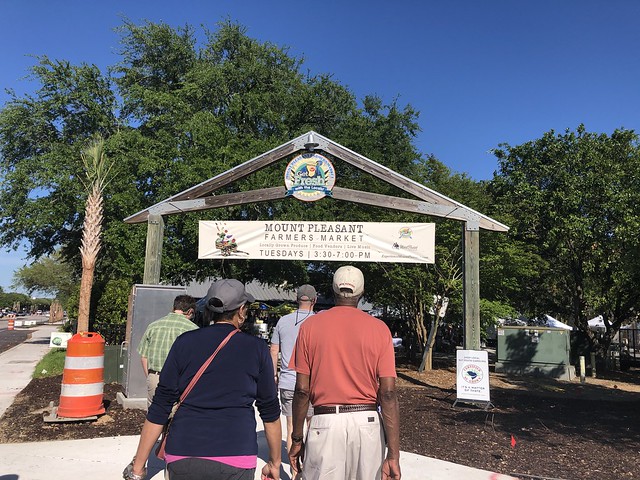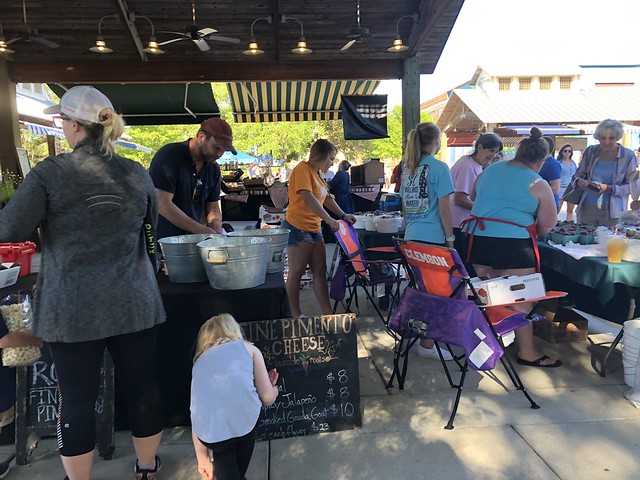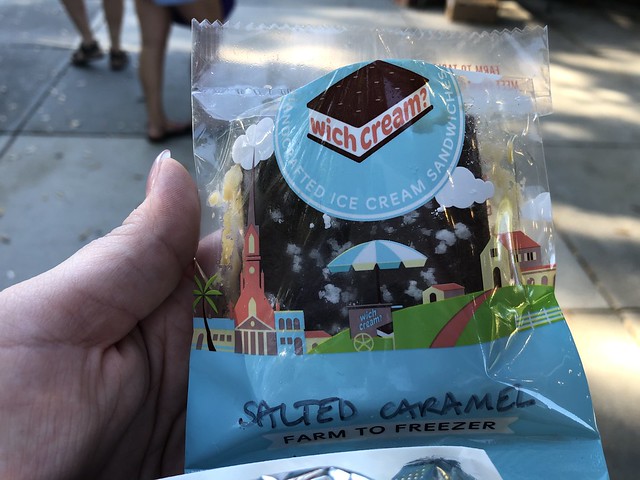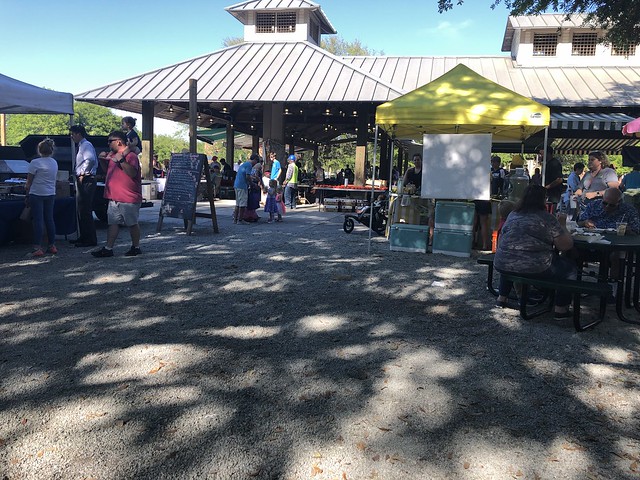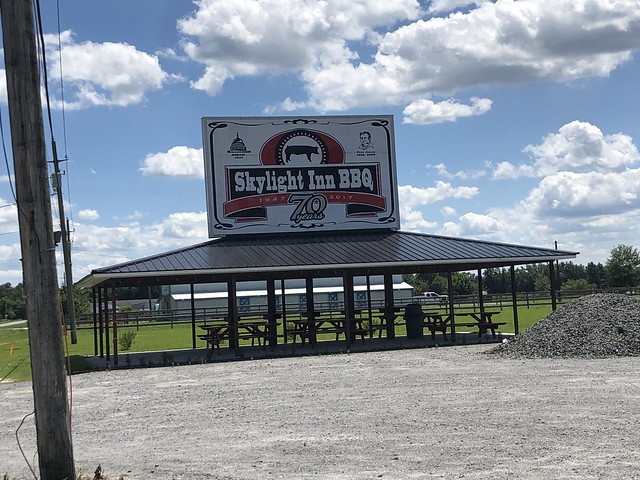
Skylight Inn BBQ in Ayden, North Carolina, is known for its pulled pork bbq.

It's known for its whole hog cooking.
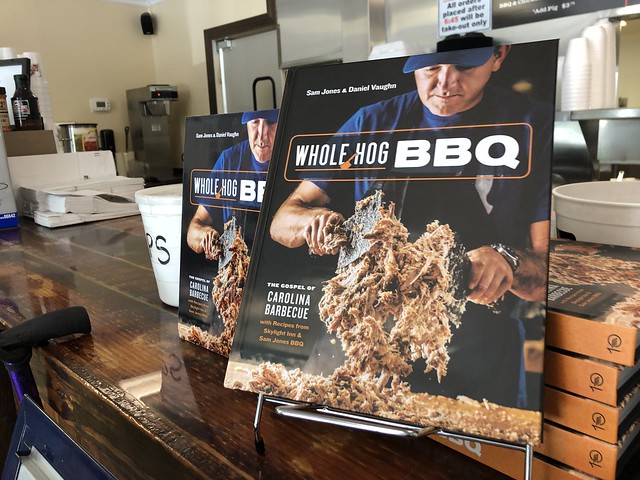
"Skylight Inn BBQ was named a "barbecue capital of America" by National Geographic in the 1970’s, which inspired the construction of the capital dome and flagpole atop the otherwise unassuming restaurant (earlier this year, Eater critic Bill Addison also named it home to one of the country's 23 essential barbecue dishes). Their whole hogs are still prepared in the same style as when Pete Jones began the business: cooked over 100% oak wood become piled of chopped and mixed tender meat and crispy skin." (EATER)
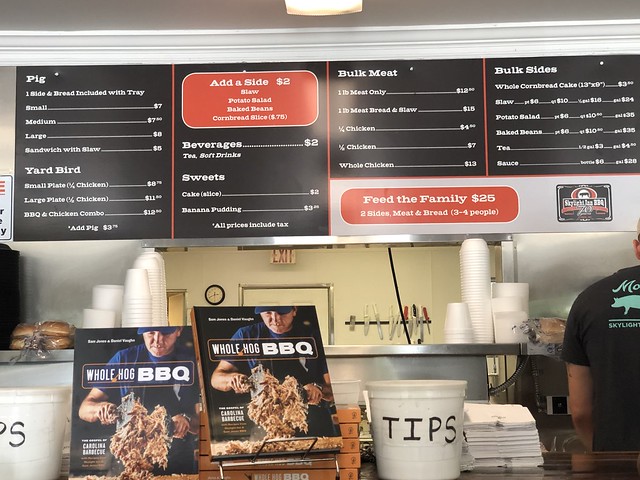
So, I simply got a small "pig" with cornbread and potato salad.
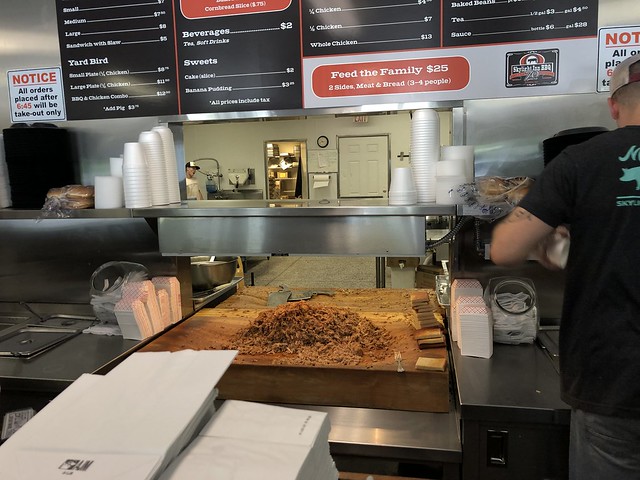
It came in a bag like this.
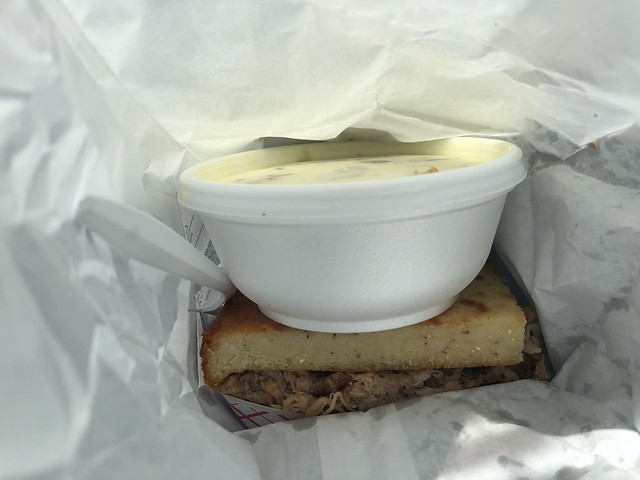
The iconic pork tray topped with a long piece of cornbread is iconic.
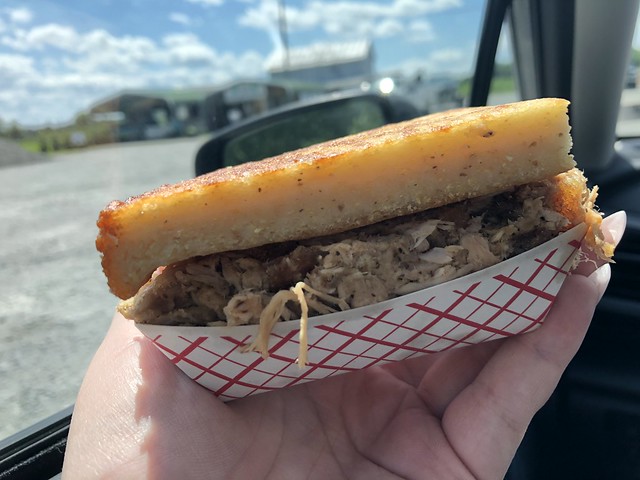
So this was really unique. It's super tender pork with little bits of crispy skin in there. So dang good. And the cornbread is not sweet at all - but perfect with a bite of pork.
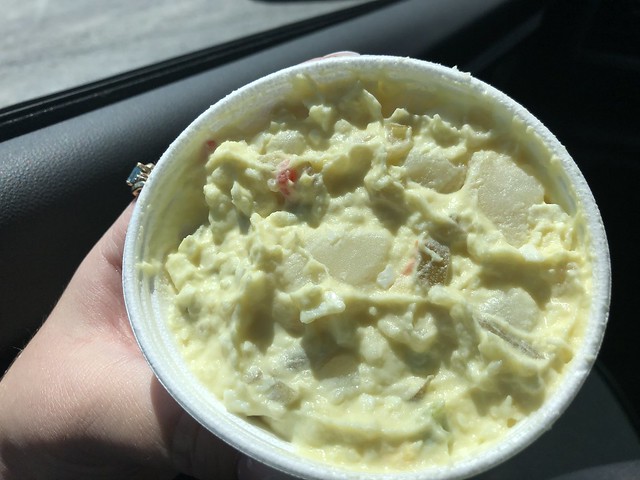
The creamy, egg-y, mustardy potato salad made for some nice tang.

So, I recently left one Charleston (WV) to visit the other Charleston (SC). And my first stop? Pepperoni rolls, of course.
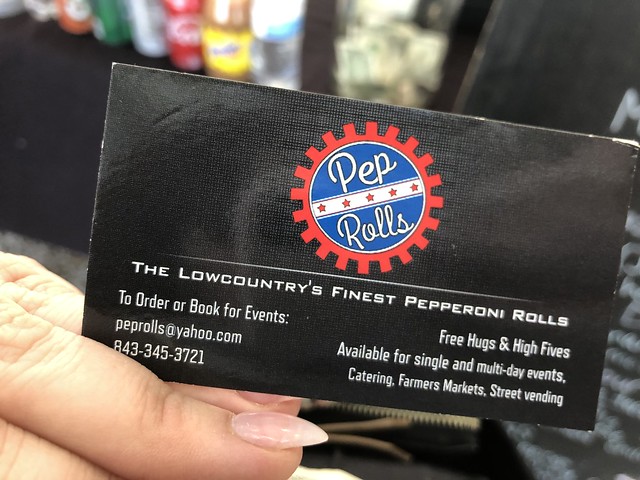
Let me explain. There's a food truck - or stand - in South Carolina that is sharing the love of the pepperoni roll for folks down south: Pep Rolls.

"Pep Rolls was formed in September of 2013 by two entrepreneurial minded friends from West Virginia. Mathias and Eric grew up on pepperoni rolls in Fairmont, WV and came to Charleston, South Carolina with empty stomachs and no where to find their fill of the delicious treat. Through experimentation, a hidden baking talent was found and Pep Rolls was born with the hope of feeding the people of Charleston this truly unique and delicious treat that they love.
Each order is prepared and baked from scratch. An Italian style bread roll is stuffed with pepperoni, seasoned, and baked to golden perfection. During the baking process, the pepperoni releases oil which flavors the bread. The result is a hearty roll that is hard on the outside, flaky on the inside, and deliciously filling.
Great for lunches, dinners, appetizers, tailgates, restaurants, catered events, showings, or bars (just to name a few) a Pep Roll is truly versatile and truly delicious. You need to eat one right now!
We sell our pepperoni rolls along with an extended menu including hotdogs, nachos, and drink, from two of our mobile food set ups, which includes a food cart."

So I made my way to a farmers market that they were set up at and perused their menu.
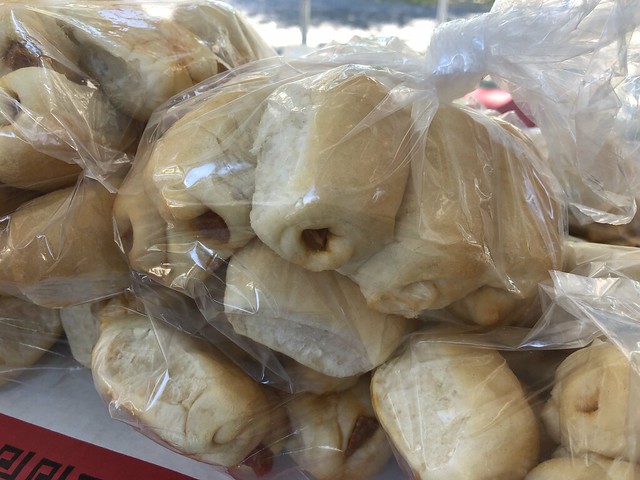
I went with the Tommy D, which is their classic - with cheese and marinara.

And it was a whole meal. But really tasty!
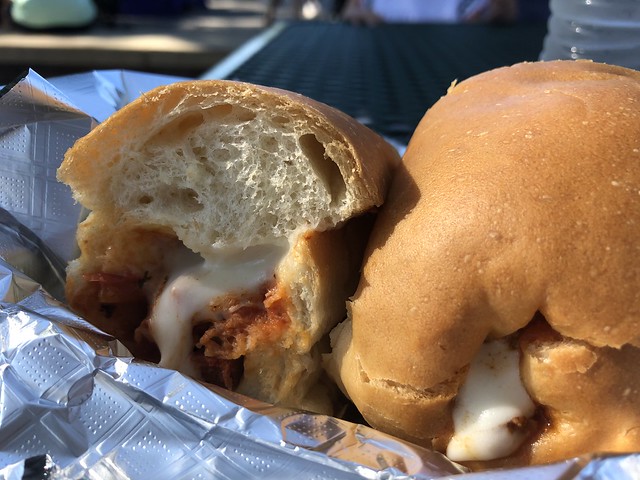
Have you tried it yet?
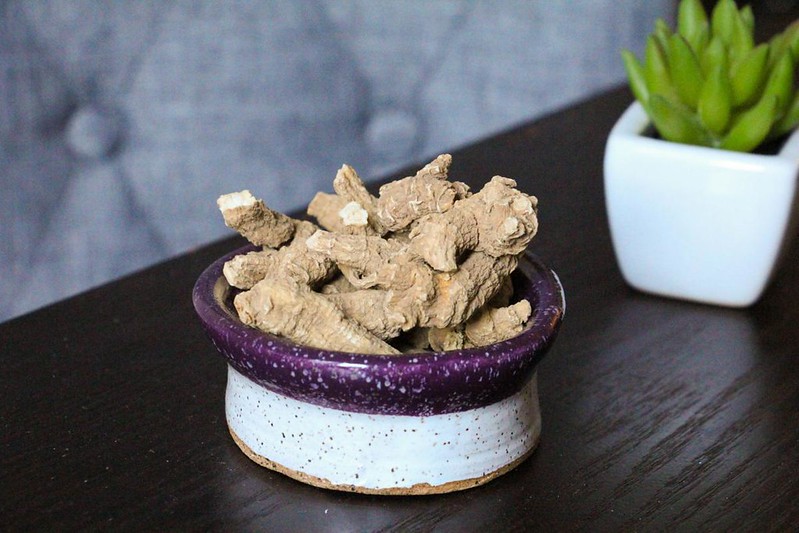
Here's my latest column at the Charleston Gazette-Mail:
Ginseng is sometimes referred to as the black market herb of Appalachia.
It is the root of a perennial plant that has been used for more than 200 years as an herbal medicine around the world — particularly in parts of Asia. Historically, many have claimed it has benefits as an all-around tonic, energy booster and aphrodisiac.
And this prized root can be found right here in Appalachia.
To be clear, there are two main kinds of ginseng: Asian or Korean ginseng (Panax ginseng) and American ginseng (Panax quinquefolius). American ginseng is considered less powerful than the Asian variety, but both remain in high demand.
It’s likely Native Americans in the Appalachian area introduced colonists to ginseng. And while the herb’s use isn’t as popular in this part of the world, it was quickly discovered that exporting it could bring in a small fortune. Many have tried to cultivate the herb, but the larger roots bring in less money than the wild roots.
“Sang” can bring in hundreds of dollars per pound, which requires about 100-300 small roots. That has led to generations of “ginsenging” in the Appalachian Mountains.
The centuries-old tradition has been a way of life for many in Appalachia. From September through December, mountain families harvest the wild ginseng roots to sell to dealers who ship to Asia. Varying amounts of income are made, but there’s no denying its importance as a pastime.
Even frontiersman Daniel Boone was known to export ginseng, and George Washington reportedly wrote about the ginseng traders of the mountains in his diary. The impact of the herb in the area goes back hundreds of years.
Harvesters face a number of hurdles: the weather, deer, turkey and rodents. And, other harvesters. That, paired with wild ginseng’s endangered status, makes the mountain gold more difficult to find.
But the journey to spot the ripened berry clusters, the yellow leaves and the mature roots is rewarding — whether financially or emotionally. Ginseng hunting is a favorite activity for many families that has become a fond Appalachian tradition and makes use of the land available. And, that is a true Appalachian quality.
Ginseng is sometimes referred to as the black market herb of Appalachia.
It is the root of a perennial plant that has been used for more than 200 years as an herbal medicine around the world — particularly in parts of Asia. Historically, many have claimed it has benefits as an all-around tonic, energy booster and aphrodisiac.
And this prized root can be found right here in Appalachia.
To be clear, there are two main kinds of ginseng: Asian or Korean ginseng (Panax ginseng) and American ginseng (Panax quinquefolius). American ginseng is considered less powerful than the Asian variety, but both remain in high demand.
It’s likely Native Americans in the Appalachian area introduced colonists to ginseng. And while the herb’s use isn’t as popular in this part of the world, it was quickly discovered that exporting it could bring in a small fortune. Many have tried to cultivate the herb, but the larger roots bring in less money than the wild roots.
“Sang” can bring in hundreds of dollars per pound, which requires about 100-300 small roots. That has led to generations of “ginsenging” in the Appalachian Mountains.
The centuries-old tradition has been a way of life for many in Appalachia. From September through December, mountain families harvest the wild ginseng roots to sell to dealers who ship to Asia. Varying amounts of income are made, but there’s no denying its importance as a pastime.
Even frontiersman Daniel Boone was known to export ginseng, and George Washington reportedly wrote about the ginseng traders of the mountains in his diary. The impact of the herb in the area goes back hundreds of years.
Harvesters face a number of hurdles: the weather, deer, turkey and rodents. And, other harvesters. That, paired with wild ginseng’s endangered status, makes the mountain gold more difficult to find.
But the journey to spot the ripened berry clusters, the yellow leaves and the mature roots is rewarding — whether financially or emotionally. Ginseng hunting is a favorite activity for many families that has become a fond Appalachian tradition and makes use of the land available. And, that is a true Appalachian quality.

On my Carolina BBQ tour, I stopped at Lewis Barbecue.

Most of the previous BBQ places in the area I tried were more "hole in the wall."
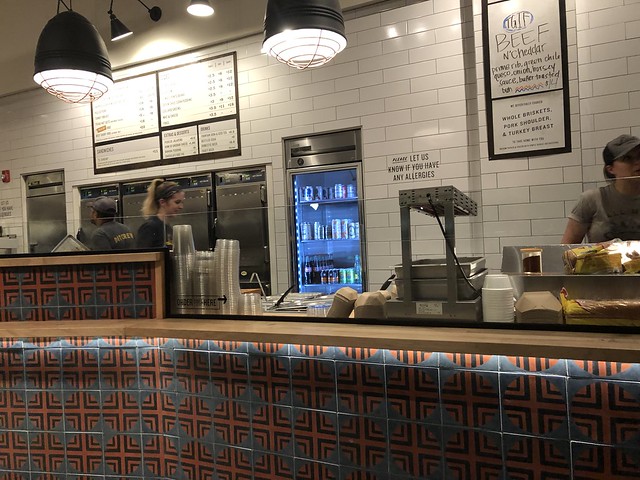
Lewis Barbecue is definitely more hip with this industrial vibe and super duper busy.

I placed an order to pick up, so I skipped the ordering part where they compile everything for you behind the counter.
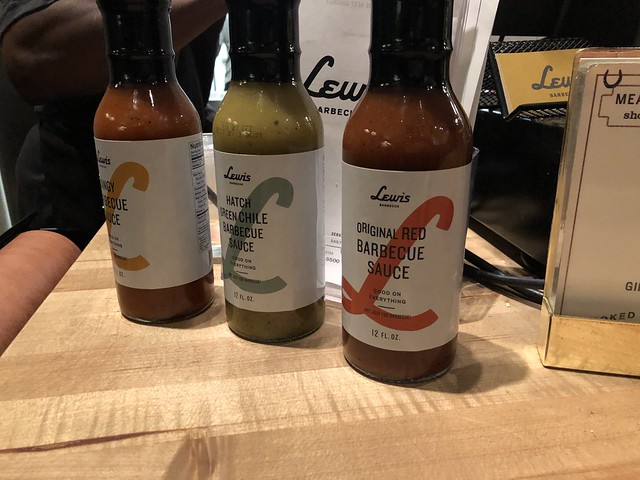
I waited a little bit for my order to be complete, but then I took it all back to my hotel to chow down.
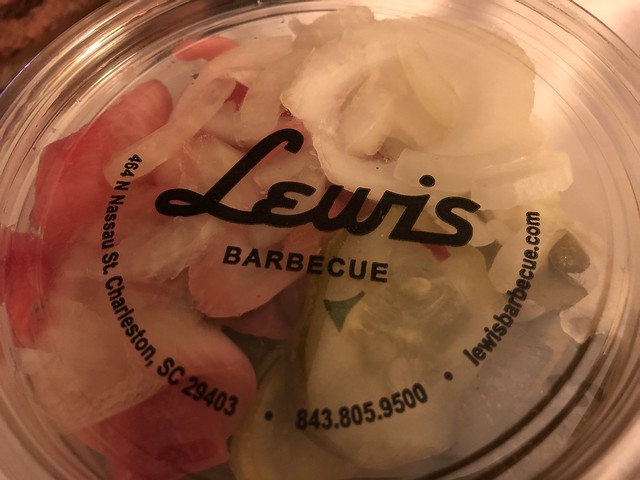
First off, they give you pickled onion, pickles and white onion for your meal.
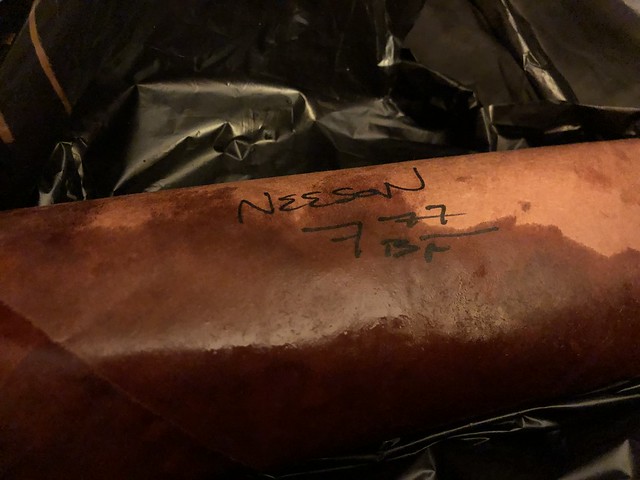
This restaurant serves Texas-style barbecue, so I had to get some brisket.
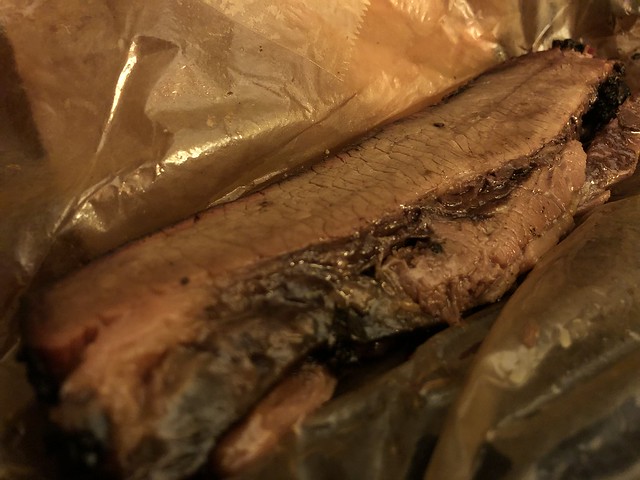
It's sliced USDA Prime Beef Brisket. I like mine on the lean side.

Speaking of sides, I went with macaroni & cheese (of course).
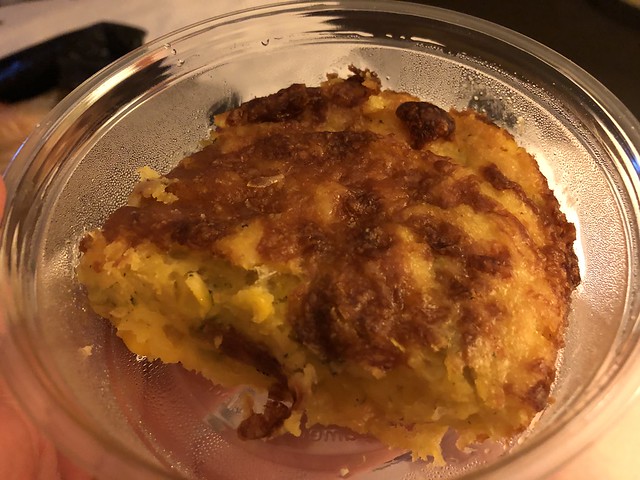
And I also got the green chile corn pudding - ohh myy goodness. Spicy, but oh so good.
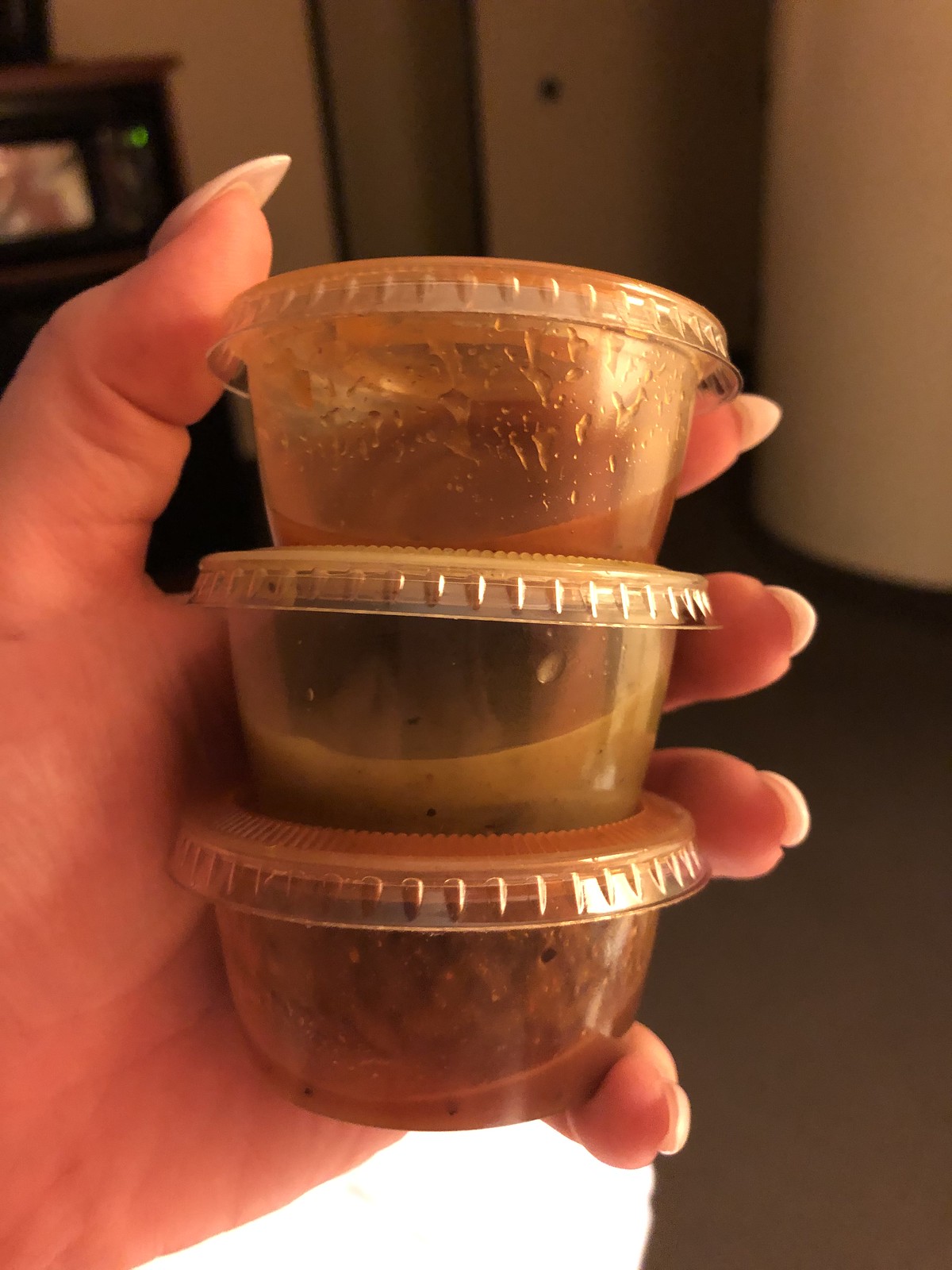
And the sauces I tried: a red, a tangy and a green hatch chile.
All work property of Candace Nelson. Powered by Blogger.

